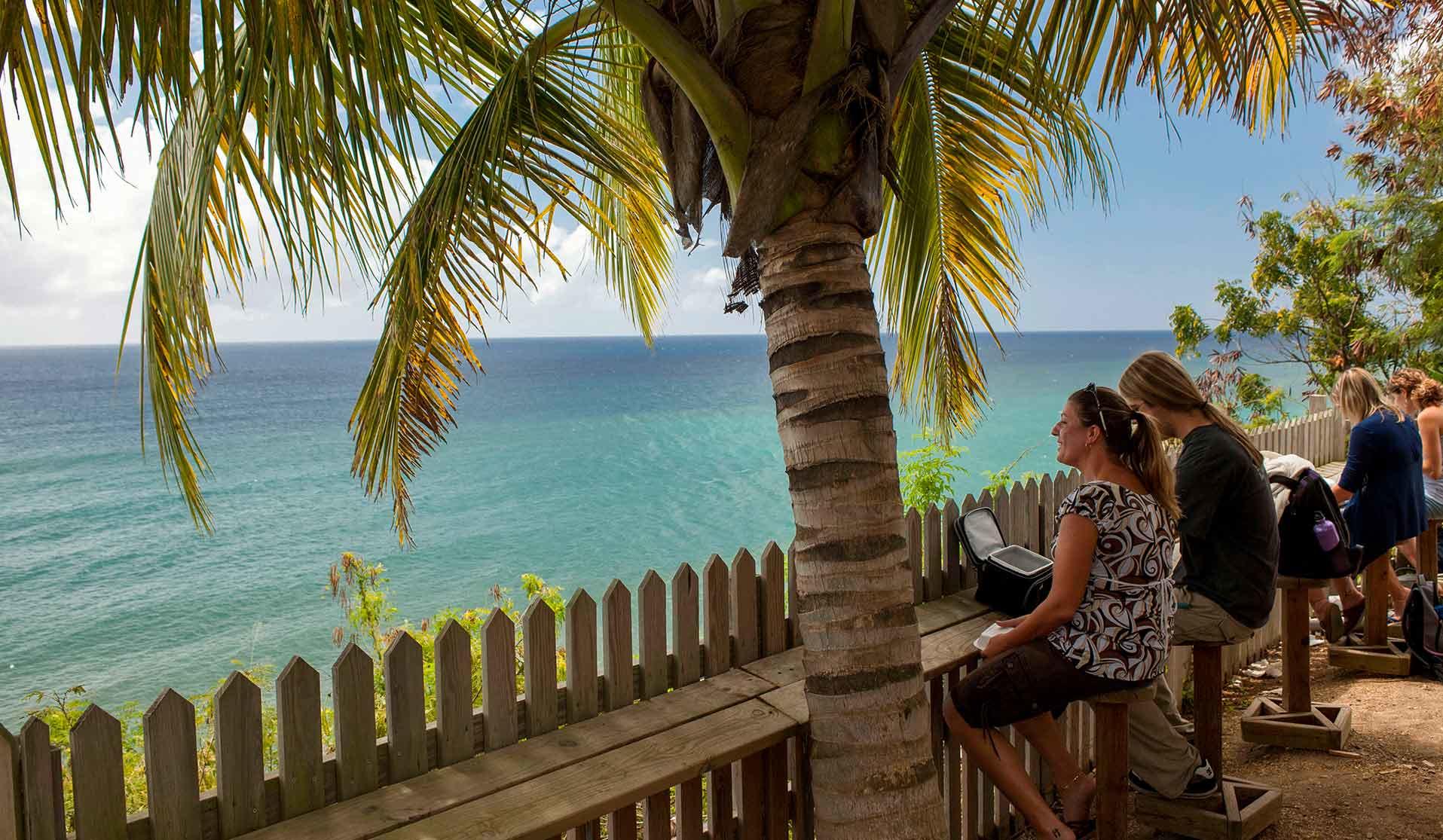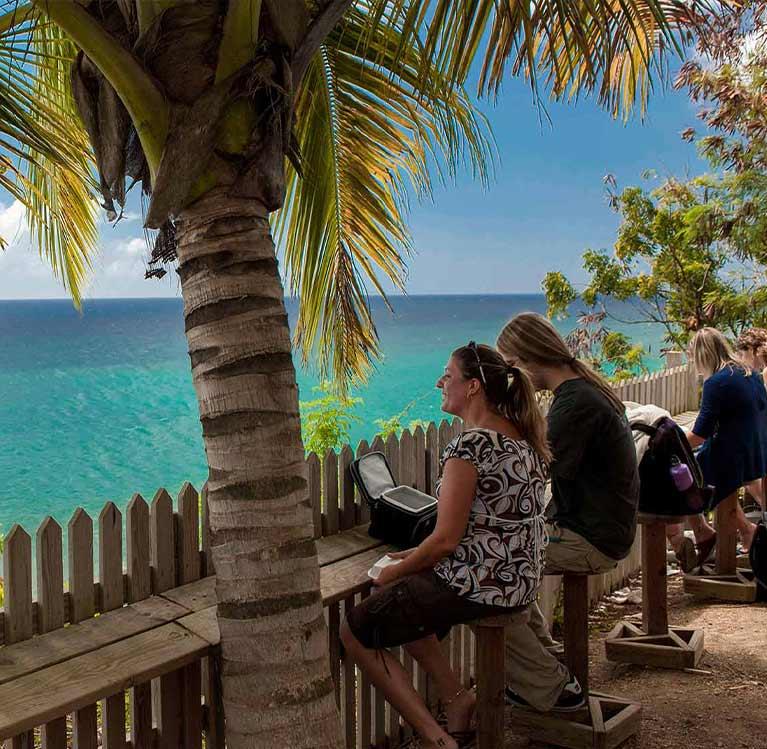SAINT KITTS OVERVIEW
St. Kitts (sometimes called St. Christopher Island) and the neighboring island of Nevis make up the Federation of St. Kitts and Nevis, the smallest country among the Caribbean Islands. The two islands host a population of about 54,000 people, most of whom—80 percent—live on St. Kitts. Basseterre, on St. Kitts, is the nation’s capital and largest city with a population of about 11,500 people. Ross University School of Veterinary Medicine is located in Basseterre. Charlestown is the main urban center of Nevis. St. Kitts and Nevis offers beautiful beaches, tropical forests, exotic wildlife, and a rich blend of culture, activities, and entertainment.
St. Kitts lies among the Lesser Antilles island group in the eastern Caribbean Sea. It is about 1,200 miles southeast of Miami, Florida, and some 200 miles east of Puerto Rico. St. Kitts may be far from the United States mainland, but Ross Vetstudents—most of whom come from the United States—feel comfortable and secure on the island. The local citizens—known as Kittitians—are renowned for making strangers feel like family. The people of Nevis—Nevisians—are also known for their hospitality.
The country of St. Kitts and Nevis has a land area of just 101 square miles. St Kitts covers 65 square miles, and Nevis is 36 square miles in size. The two islands are separated by a two mile channel of water called The Narrows. The interior of each island has mountains and volcanoes, and many of the beaches have black volcanic sand. Several beaches lie near Ross Vet along the southern coast of St. Kitts.
English is the official language of St. Kitts and Nevis. The country was once part of a British colony, and it remains a member of the Commonwealth of Nation
Everybody may be on “island time,” but Atlantic Standard Time (AST) is observed throughout the year. According to the time of year, AST is either the same as or one hour earlier than Eastern Standard Time in the United States.
St. Kitts has a tropical climate. The average annual temperature is 78 °Fahrenheit (25 °Celsius), and the annual rainfall amounts to about 55 inches. The climate is perfect for Ross Vet students who want to relax by the beach, go sailing or hiking, or attend outdoor festivals.
The currency in St. Kitts is the Eastern Caribbean Dollar (XCD or EC$), which maintains a fixed exchange rate with the U.S. dollar (U.S. $1.00 = EC $2.70). U.S. dollars are accepted in St. Kitts and Nevis, but local currency is used by residents living on the island.
Weather wise, there really is no bad time to visit St. Kitts. Temperatures are warm all year round. When planning a visit, however, keep in mind a few travel tips:
- Peak season—when St. Kitts draws the most tourists—is December to April
- Hotels lower their rates in May and June to attract travelers after the winter crowds
- Atlantic hurricane season begins June 1 and lasts through November 30
Many local hotels offer special rates for Ross Vet family and friends traveling to St. Kitts. To get the special rates, trips must be booked directly through the hotels, not through a travel agency, and rates are always subject to change. Car rentals are available for visitors to the island.
Arawak and Carib Indians lived on what is now St. Kitts long before Christopher Columbus sailed by the island in 1493 and named it after himself. British settlers arrived on St. Christopher’s Island in 1623, and it later became part of the British colony of St. Christopher-Nevis-Anguilla. The British nicknamed the island St. Kitt’s, short for St. Christopher’s, and the name eventually took root as the formal name of the island. The island of Anguilla became a separate British dependency in 1980, and St. Kitts and Nevis became an independent nation in 1983.
Sugar production drove the economy of St. Kitts and Nevis until 2005, when the government closed the industry because of falling profits. Since then, tourism has supported the country, where people come to enjoy the beautiful climate and scenery as well as the friendly and easygoing island culture.
MOVING TO ST. KITTS
Ross Vet students arrive by airinto Robert L. Bradshaw International Airport (SKB) located just northeast of Basseterre. (Robert Llewelyn Bradshaw was the first premier of St. Kitts-Nevis-Anguilla when it was an associated state of the United Kingdom.) Passenger carriers include American Airlines, British Airways, Delta Air Lines, and LIAT.
Ross Vet orientation leaders and staff from the Department of Housing greet new students at the airport. You will receive a welcome packet and will be transported to your new island residence. You will receive additional St. Kitts information as you are led on tours of the island and taken to grocery stores and other businesses for essentials.
St. Kitts is considered safe and largely trouble-free, but visitors should always maintain vigilance of their possessions and use common sense when moving about the island. The security team at Ross Vet goes above and beyond to monitor all areas of the campus, and they are always available by phone should there be any cause for distress.
As with all international destinations, a valid passport is required to enter St. Kitts and Nevis. Upon arrival at the airport, you should present your passport, an immigration letter, and a return-trip airline ticket or printout.
For an extended stay in St. Kitts to attend Ross Vet, a passport must be stamped with the appropriate student visa from the St. Kitts government. Ross Vet helps students get their student visas after acceptance into the veterinary program. Family members living with students in St. Kitts will obtain a VIP visa with the help of the Ross Vet administrative staff as well.
HOUSING IN ST. KITTS
All new Ross Vet students are required to live on campus the first semester—with the exception of new students with special circumstances. New students arriving with children, for example, are automatically approved to live off campus.
Campus residences are considered "transitional housing” for incoming students. Students may only live on campus during the first semester at Ross Vet. After that first semester, students are required to obtain off-campus housing.
Student housing is found on the east side of campus by the waters of Basseterre Bay.
Ross Vet approves off-campus housing for students, and creates a “Ross reviewed” properties list. You can access the list through the off-campus housing website at the MyRoss student portal. Approved incoming students must arrange for off-campus housing for their second semester prior to arriving on St. Kitts. The Ross Vet Housing Department works only with property landlords who agree to abide by the Landlord Code of Conduct.
DAILY LIFE IN ST. KITTS
Many dining options are available to students on the Ross Vet campus, where breakfast, snack, and lunch items sell for roughly U.S. $5 - $8, depending on the vendor and menu.
Food options on St. Kitts and Nevis include local Caribbean fare as well as Indian, Japanese, Mexican, and Middle Eastern food. The local style of cooking, which is similar to other West Indian cuisine, features such seafood as conch, rock lobster, and saltfish, as well as such favorites as goat water stew, jerk chicken, and pigeon peas. Fruits and vegetables grow year-round in the tropical climate, and they are always available in the local markets. Water and fruit juices are generally safe to drink in St. Kitts, but bottled drinks are available for purchase at most markets and grocery stores.
Grocery stores are stocked with a wide array of packaged foods, fresh produce, poultry, fish, and vegetarian items as well. Fresh red meat is not always readily available and can be expensive. A farmer's market is held every Wednesday on campus. It offers fresh vegetables, fruit, eggs, and beef from local producers. A larger farmer's market is held near the Basseterre port Monday – Saturday.
Many places in downtown Basseterre sell such household items as fans, Rubbermaid products, cooking items, hangers, shower curtains, linens, and towels. However, larger ticket items are generally cheaper to buy before you get to St. Kitts: ship them or bring them with you.
St. Kitts is a small island, but having personal transportation is still important. Most students, staff, and faculty purchase cars or scooters after their arrival on the island. You must have a driver’s license from your home country to obtain the St. Kitts driver’s license needed to operate a vehicle. Driving is on the left-hand side of the road in St. Kitts.
Local public transportation is available in St. Kitts via a privately-run minibus system. There are two main routes: West Side and East Side. The West Side route starts in Basseterre, passes by the Ross Vet campus, and ends at Dieppe Bay. Buses cost around EC $3.00. Taxis are also available.
A bank account can be opened with an electronic or wire transfer, cash, a cashier’s check, or with a financial aid check. There is no minimum amount needed to open an account, but customers should keep enough money in their account to pay monthly service charges of about EC $15. Personal checks are subject to a six-week hold before funds are released. Traveler’s checks are not commonly used.




